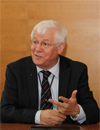 |
||
|
Russia Lays Down 6th Kilo-Class Sub for Vietnam RIA Novosti, PUBLISHED 29.05.2014 The final Kilo-class Project 636 diesel-electric submarine for the Vietnamese navy under a 2009 contract was laid down Wednesday in St. Petersburg, a defense industry source told RIA Novosti. "Today, we had the ceremony of laying down the sixth submarine for Vietnam. This is the latest submarine in this series," the source said. The $2 billion contract for the supply of six improved Kilo-class submarines to Vietnam was signed in 2009. The submarines will be armed with Club-S anti-ship missiles. The noise level of these submarines is considered the lowest among all Russian vessels. Other news: Russia May Sign Agreement to Build 8 Reactors in Iran A source close to the negotiations told journalists Thursday. Hungary Enacts Law to Expand Nuclear Power With Russian Aid HungaryТs president has signed a bill into law to expand a nuclear power plant in the country with Russian assistance. Hungary Lawmakers OK Russia Nuclear Plant Deal Russia will provide Hungary a loan of up to 10 billion euros ($13.5 billion) - around 80 percent of construction costs. |
Hero of the day 
We are currently working with the Nuclear Decommissioning Authority (NDA) on this approach, which was submitted in response to their February 2012 call for alternative proposals. We appreciate that the UK is in the early stages of their policy development activities and are pleased to be involved in such important work. INTERVIEW
Yanko Yanev OPINION
Joint Plan of Action |

